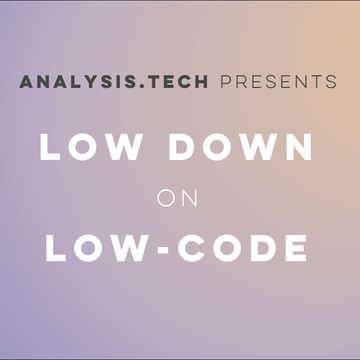

Low Down on Low-Code
Rob Koplowitz, Ryan Duguid
Join us weekly to discuss the latest and greatest in low-code and digital process automation with executives and experts. Real conversations, no marketing BS. Hosted by Rob Koplowitz, John Rymer, and Ryan Duguid. Visit analysis.tech to get in touch about your personal low-code journey and learn about ways we can help.
Episodes
Mentioned books

Jan 19, 2026 • 34min
The Six Truths of Low-Code: A Conversation with Nick Ford
In this episode of "Low Down on Low-Code," hosts Dave Marcus and Rob Koplowitz welcome Nick Ford, former CMO of Mendix and now an advisor in the low-code space. Nick shares insights from his extensive career in software development, particularly focusing on the evolution of low-code platforms and the emerging trend of vibe coding. He discusses his 'six truths' about low-code, emphasizing the importance of strategic vision over mere speed in application development. Nick argues that while low-code platforms have made software development more accessible, organizations often fail to leverage them effectively, leading to fragmented solutions that lack long-term value. He also explores the role of vibe coding in accelerating development processes and how it complements low-code solutions, suggesting that the future of software development will require a balance between Takeaways'It's never about the technology; it's always about you.''Organizations that succeed think about what they are building, not just how fast.''Vibe coding is about flow; it allows you to stay in the problem space.''The challenge is how to break the loop of building artifacts.''Agents will play a significant role in the future of software development.'

Jan 12, 2026 • 8min
New Research: The Platform Channel Challenge
John Rymer hosts Dave Marcus to discuss new research on the importance of effective channel partner strategies in the AI era. They explore common mistakes vendors make, the necessity of commitment and enablement, and the evolving landscape of channel partnerships. The conversation emphasizes the need for vendors to understand their channel partners' business models and to provide adequate support to ensure success.TakeawaysThe channel business is an accelerator for vendors.Vendors must understand the value of their offerings to the channel.Commitment is essential for effective channel strategies.Channel partners have more choices than ever before.Enablement is crucial for channel partners to succeed.Compensation strategies must be competitive to attract partners.Understanding expectations is key to partnership success.Vendors need to align with channel partners' business models.Feedback from partners is vital for continuous improvement.The landscape of channel partnerships is evolving rapidly.

Jan 5, 2026 • 22min
Rick & John: Low-Code and the Challenge of Distributed Data
In this episode of Lowdown on Low Code, host John Rymer and data expert Rick Greenwald delve into the complexities of data governance within the low code movement. They discuss the challenges posed by distributed data, the elusive quest for a single source of truth, and the importance of understanding data correctness in context. The conversation emphasizes the need for effective governance strategies that align with the realities of distributed data systems and the role of developers in maintaining data integrity.Takeaways-Rick Greenwald has over 40 years of experience in data.-Distributed data refers to data from multiple sources, not just geographical distribution.-The desire for a single uniform data pool is common but challenging to achieve.-Correctness of data is context-dependent and varies by use case.-Governance is essential but often overlooked in data management.-Developers play a role in data governance through their interactions with end users.-Many systems operate in silos, reducing the need for unified governance.-AI agents require access to diverse data but complicate governance.-Organizations must recognize that all data is governed, whether they acknowledge it or not.-Having too many versions of data is a sign of multiple use cases, not poor management.

Dec 22, 2025 • 30min
Gonçalo Borrêga of OutSystems: AI Meets Low-Code in Mission Critical Apps
In this episode of Low Down on Low-Code, hosts Rob Koplowitz and John Rymer welcome Gonçalo Borrêga from OutSystems to discuss the intersection of AI and low-code development. They explore Gonçalo's journey to OutSystems, the challenges enterprises face in leveraging AI, and the evolving role of low-code platforms in software development. The conversation highlights the importance of data management, accountability in AI decision-making, and the potential for AI to enhance business user involvement in application development. The episode concludes with insights into innovative uses of AI in the industry.TakeawaysGonçalo Borrêga emphasizes the importance of vision and pragmatism in technology.Enterprises struggle with AI due to tool sprawl and lack of accountability.AI's non-deterministic nature raises security concerns for enterprises.Low-code development is not dead; it evolves with new technologies.AI can enhance the involvement of business users in software development.Managing data context is critical for effective AI implementation.Innovative uses of AI can transform legacy systems and processes.Low-code platforms can leverage AI for better code generation.The future of software development will require a blend of low-code and traditional coding.AI can facilitate knowledge transfer between business and IT users.

Dec 8, 2025 • 31min
Praveen Seshadri of Thunk.AI: The New App Dev World
In this episode of Low Down on Low-Code, hosts Rob Koplowitz and John Rymer engage with Praveen Seshadri, founder of Thunk AI and former founder of AppSheet. They discuss the evolution of low-code and no-code platforms, the transition to intelligent applications powered by AI, and the future of software development. Praveen shares insights from his journey in tech, the challenges of traditional software development, and how AI can empower business users to create applications without needing extensive programming knowledge. The conversation emphasizes the importance of adapting to new technologies and the potential for democratizing software development.TakeawaysPraveen Seshadri has a PhD in computer science and has worked on database systems.He founded AppSheet, which was acquired by Google, and later started Thunk AI.The traditional low-code and no-code platforms are becoming less relevant due to advancements in AI.AI can automate the generation of deterministic code, reducing the need for human intervention.The future of software lies in intelligent applications that can handle ambiguity and flexibility.Businesses need to adopt an AI-first approach to stay competitive.The democratization of software development is possible with AI, empowering non-technical users.Reliability and consistency are crucial for deploying AI solutions in business.Organizations should explore both tactical and strategic approaches to AI adoption.The potential for AI to transform industries is vast, with opportunities for new applications.

Dec 1, 2025 • 45min
Decidewise.net: Decision Intelligence and Low-Code
In this episode of the Low Down on Low-Code, John Rymer, Benjamin Baer, and Linda Crowe discuss the emerging field of decision intelligence, its importance in digital process automation, and the role of community in fostering knowledge sharing among decision-making professionals. They explore the journey of establishing DecideWise, a community focused on decision intelligence, and the significance of low-code solutions in enhancing decision-making processes. The conversation also delves into the challenges of data management and governance, the shift towards a decision-first approach, and the future potential of decision intelligence in various industries.TakeawaysDecision intelligence automates decision-making processes.Community engagement is crucial for knowledge sharing.Low-code solutions enhance change management capabilities.Data management challenges persist in decision intelligence.The industry is shifting towards a decision-first approach.AI plays a significant role in decision intelligence.Integration of multiple technologies is essential.Decision intelligence is a growing market.Knowledge management is vital for organizational success.Join the DecideWise community for valuable resources.This podcast was edited by a human while watching Love Actually.

Nov 24, 2025 • 46min
Stevie Sims of Shell: From Hard Hat to Citizen App Maker
In this episode of the Low Down on Low-Code podcast, hosts Francis Carden and John Rymer engage with Stevie Sims, a citizen developer from the energy sector. They explore Stevie's journey from operations to automation, the significance of citizen development, and the evolving role of AI in problem-solving. The conversation emphasizes the importance of collaboration between IT and business, the need for domain expertise, and the challenges posed by generative AI. Stevie shares valuable insights and advice for aspiring developers, highlighting the necessity of understanding business problems and leveraging technology effectively.TakeawaysStevie Sims transitioned from operations to automation in the energy sector.Citizen developers can significantly enhance business processes.Understanding turnaround events is crucial in the energy industry.Low-code platforms empower individuals to solve business problems.Continuous learning and resourcefulness are key in tech development.Domain expertise is essential for effective problem-solving.AI can accelerate development but must be approached cautiously.Collaboration between IT and business is vital for success.Generative AI poses risks of producing inaccurate information.Giving back to the community is a rewarding aspect of the tech journey.

Nov 10, 2025 • 18min
New Research w/Julie Ask: Transform Failing AI Strategies
NEW RESEARCH ALERT: TRANSFORM FAILING AI STRATEGIES WITH HOSTHOW HUMANS, OBJECTIVES, STRATEGY, AND TECHNOLOGY DRIVE MEASURABLE RESULTSJulie Ask Advisory and Analysis.Tech collaborated on this critical new research. This week's Low Down on Low-Code provides an introduction.The conversation focuses on the importance of integrating human factors into AI strategy development. It emphasizes that technology decisions should come after understanding the capabilities and readiness of the people who will use it. The discussion highlights the need for clear business objectives and evaluating use cases to ensure that AI is the right fit for organizational goals.TakeawaysSenior executives are pushing for AI strategies.Technology decisions should prioritize human readiness.Critical thinking skills are essential for AI use.Understanding user comfort with technology is crucial.Business objectives must guide AI implementation.Evaluating use cases is key to effective AI strategy.Training and iteration are necessary before AI deployment.Human beings should be at the center of AI strategy.AI should support clear business objectives.The right technology must align with user capabilities.

Nov 3, 2025 • 36min
Niels de Bruijn on Hyand's Low-Code Selection Tool
In this episode of Low Down on Low-Code, hosts Rob Koplowitz and John Rymer engage with Niels de Bruijn to discuss a new tool designed to help organizations select the right low-code platform for their needs. Niels shares his journey in tech, the development of the tool, its features, and the importance of understanding user requirements. The conversation also touches on the limitations of the tool, the consolidation of low-code platforms in organizations, and the integration of AI into low-code solutions.TakeawaysThe tool provides a starting point for selecting low-code platforms.Niels de Bruijn has a rich background in tech and consultancy.Understanding user needs is crucial for platform selection.The tool includes demo videos for better user experience.AI integration is rapidly evolving in low-code platforms.Consultancy work is essential even after using the tool.The tool is free and does not require user tracking.Different platforms cater to different use cases.Consolidation of platforms is a common trend in organizations.The tool helps in navigating the complex low-code landscape.

Oct 27, 2025 • 34min
Mike Hichwa: 30 years of Oracle low-code and counting
In this episode of Low Down on Low-Code, hosts John Rymer and Rick Greenwald engage with Mike Hichwa, a veteran in the low-code space, discussing the evolution of low-code development, the changing roles of developers, and the importance of citizen developers. They explore the core principles of low-code, the impact of AI, and the challenges of technical debt in application development. The conversation also touches on personal interests, showcasing the multifaceted nature of the guests.TakeawaysMike Hichwa has been involved in low-code development since the early days of Oracle Forms.The transition from traditional coding to low-code has empowered citizen developers.Low-code is fundamentally about creating models that abstract complex coding tasks.AI is poised to significantly influence the adoption of low-code platforms.Technical debt is becoming a major concern for organizations in application development.Collaboration between citizen developers and IT professionals is essential for success.User experience experts play a critical role in application development.Low-code platforms can help reduce the complexity of application development.Understanding the model behind low-code solutions is crucial for effective use.Vibe coding can be a useful tool for prototyping but has limitations.


